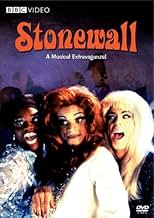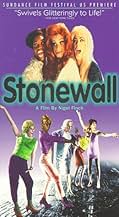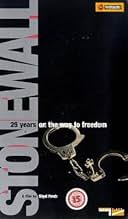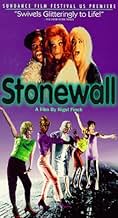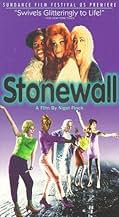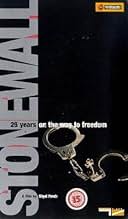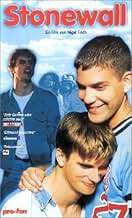IMDb रेटिंग
7.1/10
1.8 हज़ार
आपकी रेटिंग
अपनी भाषा में प्लॉट जोड़ेंA group of homosexual people try to live with dignity and self-respect while events build to the opening battle in the major gay rights movement.A group of homosexual people try to live with dignity and self-respect while events build to the opening battle in the major gay rights movement.A group of homosexual people try to live with dignity and self-respect while events build to the opening battle in the major gay rights movement.
- निर्देशक
- लेखक
- स्टार
- पुरस्कार
- 3 जीत और कुल 2 नामांकन
Guillermo Diaz
- La Miranda
- (as Guillermo Díaz)
Luis Guzmán
- Vito
- (as Luiz Guzman)
Meg Gibson
- Agnes
- (as Margaret Gibson)
फ़ीचर्ड समीक्षाएं
I have a great deal of admiration for this engaging effort to explain the roots of the modern gay rights movement, produced on a shoe-string by a director with an admirable sense of style, pacing, and resourcefulness. Though filtered through a distinctly British class-consciousness, it does a highly respectable job of catching the main trends in gay America from my not-quite-misspent youth.
Furthermore, it is candidly presented as a subjective, fictional account, mooting complaints like "the bus is too old," "no New York apartment is that big" and "the Stonewall bar never looked that clean."
Nonetheless, one small detail and one large item are egregiously wrong. The detail is the rather elementary fact that the Stonewall was never licensed; it was a "private" mob-run club. It was raided not because all cops are homophobes but because, in the absence of official licensing, gay bars were, in every sense, illegal. The scenes where Stonewall employees display great care about the liquor laws are ridiculous, since the bar operated outside the law.
The larger item is the failure to capture the sense of exhilaration that swept throught the country in 1969. This was the year men walked on the moon, the year of Woodstock, the year an X-rated gay-themed film ("Midnight Cowboy") won the "Best Picture" Oscar, and (biggest miracle of all to us New Yorkers) the year the Mets, long "lovable losers," won the World Series. Anything was possible, and gay people joined the party with enthusiasm.
Furthermore, it is candidly presented as a subjective, fictional account, mooting complaints like "the bus is too old," "no New York apartment is that big" and "the Stonewall bar never looked that clean."
Nonetheless, one small detail and one large item are egregiously wrong. The detail is the rather elementary fact that the Stonewall was never licensed; it was a "private" mob-run club. It was raided not because all cops are homophobes but because, in the absence of official licensing, gay bars were, in every sense, illegal. The scenes where Stonewall employees display great care about the liquor laws are ridiculous, since the bar operated outside the law.
The larger item is the failure to capture the sense of exhilaration that swept throught the country in 1969. This was the year men walked on the moon, the year of Woodstock, the year an X-rated gay-themed film ("Midnight Cowboy") won the "Best Picture" Oscar, and (biggest miracle of all to us New Yorkers) the year the Mets, long "lovable losers," won the World Series. Anything was possible, and gay people joined the party with enthusiasm.
10Boyo-2
Frederick Weller is the perfect embodiment of the frustrated gay male who is ready for a change, and a revolution to boot. He arrives in NYC, somewhat naive, and is befriended by a drag queen who introduces him to the city and its many characters. He is discouraged almost immediately but it starts a feeling in him that makes him uneasy about the way things are. At the time bars were getting raided constantly and there were other ridiculous laws, too, none of which sit well with him. He befriends another man who enlightens him about rallies, a peaceful march to Philadelphia, and takes him to Fire Island. But its all still bad, since he knows he's being treated badly because of who he is.
Climax of the movie is the riot at the end, which wasn't much of one as far as I'm concerned, but the police finally found they were being stood up to, and they didn't like it.
All the actors are excellent, especially Weller, who's inexplicably not a major star, and Guillermo Diaz as La Miranda, a not-as-tough-as-she-pretends-to-be drag queen. Its La Miranda's version of things, and when she says 'we're American as apple pie' as the last line of the movie, you can't help but believe her.
Kudos to all involved. 9/10.
Climax of the movie is the riot at the end, which wasn't much of one as far as I'm concerned, but the police finally found they were being stood up to, and they didn't like it.
All the actors are excellent, especially Weller, who's inexplicably not a major star, and Guillermo Diaz as La Miranda, a not-as-tough-as-she-pretends-to-be drag queen. Its La Miranda's version of things, and when she says 'we're American as apple pie' as the last line of the movie, you can't help but believe her.
Kudos to all involved. 9/10.
While Stonewall hits upon some facts about the Stonewall Riots, it is pretty much based upon fiction. Much of this movie is apocryphal. For example, the who idea that the Stonewall Riots were somehow influenced by Judy Garland's death was suggested by the homophobic police-- as a bigoted joke.
New research shows that the Stonewall Riots were started by what most people would classify as sissies from nearby bars after hearing that police were beating up Stonewall patrons. There weren't very many drag queens allowed in the Stonewall.
The police who conducted the bust were not from the precinct that was in charge of the area; but a separate group dealing with morals violation. In fact, once barricaded inside the bar, they called for help, but the Sixth Precint wouldn't help, having already been paid off by the mob who owned the bar.
New research shows that the Stonewall Riots were started by what most people would classify as sissies from nearby bars after hearing that police were beating up Stonewall patrons. There weren't very many drag queens allowed in the Stonewall.
The police who conducted the bust were not from the precinct that was in charge of the area; but a separate group dealing with morals violation. In fact, once barricaded inside the bar, they called for help, but the Sixth Precint wouldn't help, having already been paid off by the mob who owned the bar.
The major value of the film Stonewall is to remind all of us just what gay people dealt with before a big rebellion took place in the last week of June in 1969. The film is based on a novel by historian Martin Duberman and the director Nigel Finch died before his testament of the Stonewall Rebellion could be seen and appreciated.
A couple of love stories are involved here. Country boy Frederick Weller arrives from Kansas and he's hoping that New York City will be more accepting of him. Or at least he'll find a community of sorts. That part of the story hasn't ever changed. He's caught between young closeted gay lawyer Brendan Corbalis and professional drag queen Guillermo Diaz.
The second love story is between the owner of the Stonewall Inn and a drag queen played by Bruce MacVittie and Duane Boutte. MacVittie has lived all his life with all the insane rules placed on same sex contact by society and its criminal code against sodomy. Boutte is ready to rebel, but MacVittie counsels go slow it's the way of things in this world. Still he's having just about enough of it.
Weller is a rebellious sort, he gets caught in a bar raid the first night he's in New York. Apparently the concept of freedom in America doesn't extend to those who love of the same sex. He finds the Mattachine Society with their button down ways and it ain't for him. But in a way they do fire his revolutionary ardor.
The Mattachine Society comes in for quite a beating in Stonewall. They were a radical concept in their idea when the mere idea of protesting these laws was radical. In a scene laced with humor and irony Weller is with a group with accompanying press who challenges the law against serving liquor to known homosexuals. Yes there indeed was such a law. The only place that enforces the ordinance is a gay bar because they're afraid of police entrapment.
Of course the end of the film is the riot at the Stonewall Inn which sparked a movement. The unbelievable but true twist on events is the cops including the NYPD's crack tactical police unit equipped for riots retreating into a newly emptied Stonewall Inn for their own safety is truly a sight to behold.
This is a fine film which captures the spirit of that night when it wasn't button down businessmen and lawyers, but rebels in high heels who changed America and the world.
A couple of love stories are involved here. Country boy Frederick Weller arrives from Kansas and he's hoping that New York City will be more accepting of him. Or at least he'll find a community of sorts. That part of the story hasn't ever changed. He's caught between young closeted gay lawyer Brendan Corbalis and professional drag queen Guillermo Diaz.
The second love story is between the owner of the Stonewall Inn and a drag queen played by Bruce MacVittie and Duane Boutte. MacVittie has lived all his life with all the insane rules placed on same sex contact by society and its criminal code against sodomy. Boutte is ready to rebel, but MacVittie counsels go slow it's the way of things in this world. Still he's having just about enough of it.
Weller is a rebellious sort, he gets caught in a bar raid the first night he's in New York. Apparently the concept of freedom in America doesn't extend to those who love of the same sex. He finds the Mattachine Society with their button down ways and it ain't for him. But in a way they do fire his revolutionary ardor.
The Mattachine Society comes in for quite a beating in Stonewall. They were a radical concept in their idea when the mere idea of protesting these laws was radical. In a scene laced with humor and irony Weller is with a group with accompanying press who challenges the law against serving liquor to known homosexuals. Yes there indeed was such a law. The only place that enforces the ordinance is a gay bar because they're afraid of police entrapment.
Of course the end of the film is the riot at the Stonewall Inn which sparked a movement. The unbelievable but true twist on events is the cops including the NYPD's crack tactical police unit equipped for riots retreating into a newly emptied Stonewall Inn for their own safety is truly a sight to behold.
This is a fine film which captures the spirit of that night when it wasn't button down businessmen and lawyers, but rebels in high heels who changed America and the world.
The night they raided the NYC underground bar Stonewall was the night gay pride exploded into the mainstream. This film tells the story of that night through a group of characters who each shine with their own unique story. There's La Miranda and Matty Dean, the central fictional figures of this film, and their struggle to find love, respect and honour in 1969 against numerous odds. But there are many other important stories told in this beautiful film. Dazzling, bright, strong and rousing are just four words but they settle easily into any sentence describing Stonewall - the movie. Its one of the most colourful and well designed films I've seen - so lush and grand in its set design and the musical numbers blaze. This delicious film is an aching, sweet transport into another time and place and provides a jaunty historical summation of the pride and intensity the name Stonewall still retains in the twentieth century history of the gay experience. Its a love story, a political tale, a drag odyssey and a wonderful expression of the powerful bonds that dark times promote and cement. Most of all, its a film to share with people you care about and want to grow through life with - so march to see it now.
क्या आपको पता है
- ट्रिवियाDirector Nigel Finch died of AIDS shortly after completing this, his last film.
- गूफ़The sip-in depicted took place in 1966, not 1969. It was not the Stonewall Inn that refused service, but a bar called Julius (which is shown as the sip-in's first stop in the film).
- भाव
Princess Ernestine: La Miranda, girl, why do you always put yourself though this?
La Miranda: Why, Princess Ernestine? It's for the sheer, irresistible goddamn glamour of it all.
- कनेक्शनEdited into Screen Two: Stonewall (1997)
- साउंडट्रैकAnother Green World
(Arena Theme)
Written and Performed by Brian Eno
Music with permission of BMG Music Publishing Limited
Recording with permission of Virgin Records Limited
टॉप पसंद
रेटिंग देने के लिए साइन-इन करें और वैयक्तिकृत सुझावों के लिए वॉचलिस्ट करें
- How long is Stonewall?Alexa द्वारा संचालित
विवरण
- रिलीज़ की तारीख़
- कंट्री ऑफ़ ओरिजिन
- भाषा
- इस रूप में भी जाना जाता है
- Стоунвол
- फ़िल्माने की जगहें
- उत्पादन कंपनियां
- IMDbPro पर और कंपनी क्रेडिट देखें
बॉक्स ऑफ़िस
- US और कनाडा में सकल
- $6,92,400
- US और कनाडा में पहले सप्ताह में कुल कमाई
- $74,052
- 28 जुल॰ 1996
- दुनिया भर में सकल
- $6,92,400
इस पेज में योगदान दें
किसी बदलाव का सुझाव दें या अनुपलब्ध कॉन्टेंट जोड़ें



